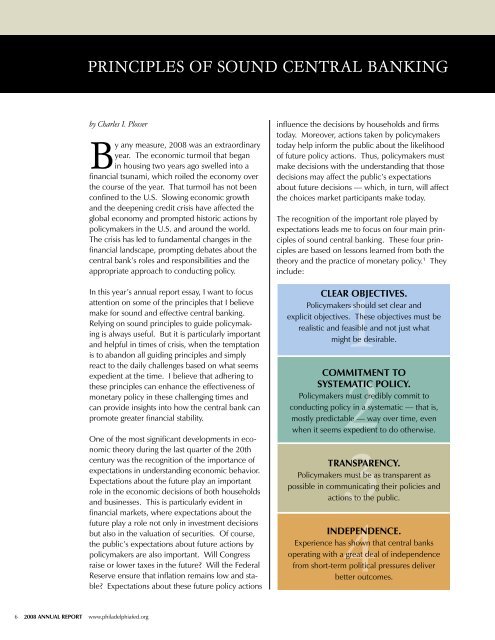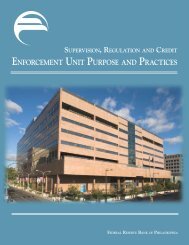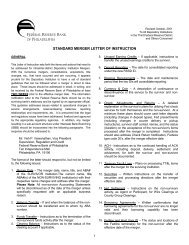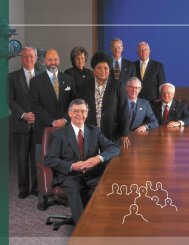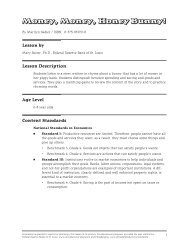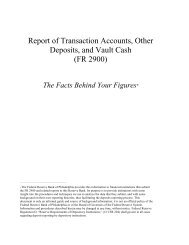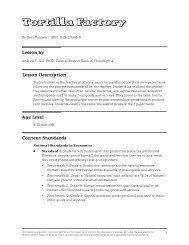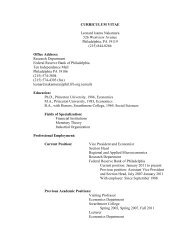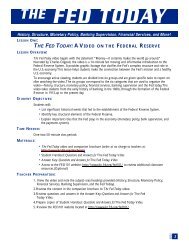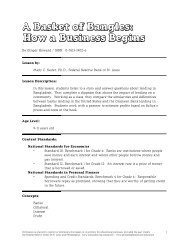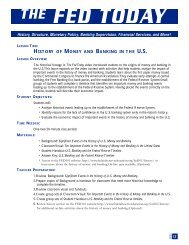Complete 2008 Annual Report - Federal Reserve Bank of Philadelphia
Complete 2008 Annual Report - Federal Reserve Bank of Philadelphia
Complete 2008 Annual Report - Federal Reserve Bank of Philadelphia
You also want an ePaper? Increase the reach of your titles
YUMPU automatically turns print PDFs into web optimized ePapers that Google loves.
Principles <strong>of</strong> Sound Central <strong>Bank</strong>ing<br />
by Charles I. Plosser<br />
By any measure, <strong>2008</strong> was an extraordinary<br />
year. The economic turmoil that began<br />
in housing two years ago swelled into a<br />
financial tsunami, which roiled the economy over<br />
the course <strong>of</strong> the year. That turmoil has not been<br />
confined to the U.S. Slowing economic growth<br />
and the deepening credit crisis have affected the<br />
global economy and prompted historic actions by<br />
policymakers in the U.S. and around the world.<br />
The crisis has led to fundamental changes in the<br />
financial landscape, prompting debates about the<br />
central bank’s roles and responsibilities and the<br />
appropriate approach to conducting policy.<br />
In this year’s annual report essay, I want to focus<br />
attention on some <strong>of</strong> the principles that I believe<br />
make for sound and effective central banking.<br />
Relying on sound principles to guide policymaking<br />
is always useful. But it is particularly important<br />
and helpful in times <strong>of</strong> crisis, when the temptation<br />
is to abandon all guiding principles and simply<br />
react to the daily challenges based on what seems<br />
expedient at the time. I believe that adhering to<br />
these principles can enhance the effectiveness <strong>of</strong><br />
monetary policy in these challenging times and<br />
can provide insights into how the central bank can<br />
promote greater financial stability.<br />
One <strong>of</strong> the most significant developments in economic<br />
theory during the last quarter <strong>of</strong> the 20th<br />
century was the recognition <strong>of</strong> the importance <strong>of</strong><br />
expectations in understanding economic behavior.<br />
Expectations about the future play an important<br />
role in the economic decisions <strong>of</strong> both households<br />
and businesses. This is particularly evident in<br />
financial markets, where expectations about the<br />
future play a role not only in investment decisions<br />
but also in the valuation <strong>of</strong> securities. Of course,<br />
the public’s expectations about future actions by<br />
policymakers are also important. Will Congress<br />
raise or lower taxes in the future? Will the <strong>Federal</strong><br />
<strong>Reserve</strong> ensure that inflation remains low and stable?<br />
Expectations about these future policy actions<br />
influence the decisions by households and firms<br />
today. Moreover, actions taken by policymakers<br />
today help inform the public about the likelihood<br />
<strong>of</strong> future policy actions. Thus, policymakers must<br />
make decisions with the understanding that those<br />
decisions may affect the public’s expectations<br />
about future decisions — which, in turn, will affect<br />
the choices market participants make today.<br />
The recognition <strong>of</strong> the important role played by<br />
expectations leads me to focus on four main principles<br />
<strong>of</strong> sound central banking. These four principles<br />
are based on lessons learned from both the<br />
theory and the practice <strong>of</strong> monetary policy. 1 They<br />
include:<br />
Clear Objectives.<br />
1<br />
Policymakers should set clear and<br />
explicit objectives. These objectives must be<br />
realistic and feasible and not just what<br />
might be desirable.<br />
2<br />
3<br />
4<br />
Commitment to<br />
Systematic Policy.<br />
Policymakers must credibly commit to<br />
conducting policy in a systematic — that is,<br />
mostly predictable — way over time, even<br />
when it seems expedient to do otherwise.<br />
Transparency.<br />
Policymakers must be as transparent as<br />
possible in communicating their policies and<br />
actions to the public.<br />
Independence.<br />
Experience has shown that central banks<br />
operating with a great deal <strong>of</strong> independence<br />
from short-term political pressures deliver<br />
better outcomes.<br />
6 <strong>2008</strong> <strong>Annual</strong> <strong>Report</strong> www.philadelphiafed.org


